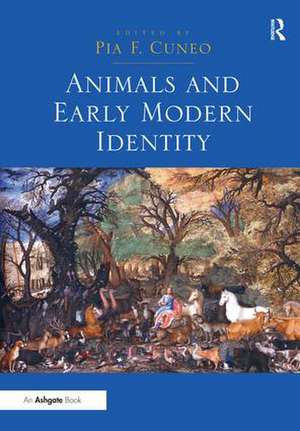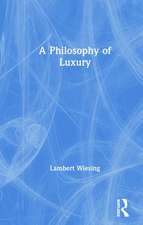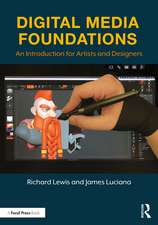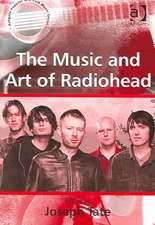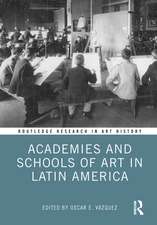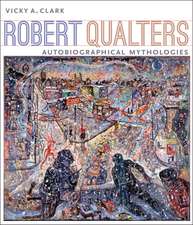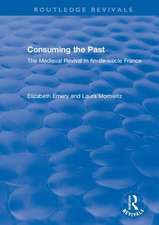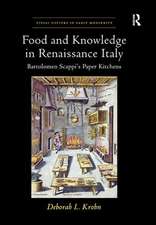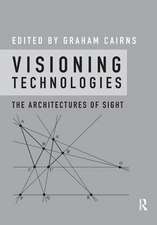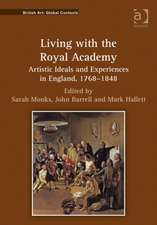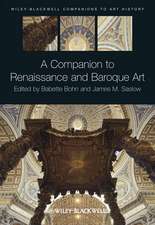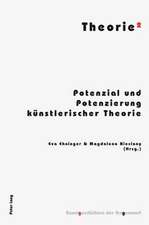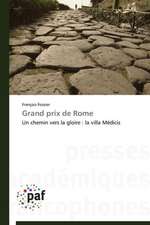Animals and Early Modern Identity
Editat de Pia F. Cuneoen Limba Engleză Hardback – 15 sep 2014
| Toate formatele și edițiile | Preț | Express |
|---|---|---|
| Paperback (1) | 315.76 lei 6-8 săpt. | |
| Taylor & Francis – 12 oct 2017 | 315.76 lei 6-8 săpt. | |
| Hardback (1) | 777.67 lei 6-8 săpt. | |
| Taylor & Francis – 15 sep 2014 | 777.67 lei 6-8 săpt. |
Preț: 777.67 lei
Preț vechi: 1035.32 lei
-25% Nou
Puncte Express: 1167
Preț estimativ în valută:
148.83€ • 154.97$ • 125.78£
148.83€ • 154.97$ • 125.78£
Carte tipărită la comandă
Livrare economică 10-24 martie
Preluare comenzi: 021 569.72.76
Specificații
ISBN-13: 9781409457435
ISBN-10: 1409457435
Pagini: 426
Ilustrații: Includes 61 b&w illustrations
Dimensiuni: 174 x 246 x 30 mm
Greutate: 1.2 kg
Ediția:New ed
Editura: Taylor & Francis
Colecția Routledge
Locul publicării:Oxford, United Kingdom
ISBN-10: 1409457435
Pagini: 426
Ilustrații: Includes 61 b&w illustrations
Dimensiuni: 174 x 246 x 30 mm
Greutate: 1.2 kg
Ediția:New ed
Editura: Taylor & Francis
Colecția Routledge
Locul publicării:Oxford, United Kingdom
Cuprins
Contents: Introduction, Pia F. Cuneo. Part I Defending the Boundaries of Identity: Man’s best friend? Dogs and pigs in early modern Germany, Alison G. Stewart; Every living beast: collecting animals and art in early modern Munich, Susan Maxwell; Where the sun don’t shine: animals and animality in Louis XIV’s royal labyrinth of Versailles (1668-74), Peter Sahlins; ‘For amusement, merry-making and good company’: horse racing at a German princely court, Miriam Hall Kirch; Breeding nobility: raising horses at early modern German courts, Magdalena Bayreuther; Horses and elite identity in early modern England: the case of Sir Richard Newdigate II of Arbury Hall, Warwickshire (1644-1710), Peter Edwards. Part II Contesting the Boundaries of Identity: Horses as love-objects: shaping social and moral identities in Hans Baldung Griens’ Bewitched Groom (circa 1544) and in 16th-century hippology, Pia F. Cuneo; On the bit: Prince Maurits, Simon Stevin, and the Spanish warhorse, Ingrid Cartwright; The tusked hog: Richard III’s boarish identity, Karen Raber; Who are the animals in the Geese Book?, Corine Schleif; Settler stock: animals and power in the mid-17th-century contact at the Cape, circa 1652-62, Sandra Swart. Part III Transcending the Boundaries of Identity: Individuality and the understanding of animals in the early modern Spanish empire, Abel A. Alves; World of wonders: exotic animals in European imagery, 1515-1650, Larry Silver; French early modern sea-monsters and modern identities, via Bruno Latour, Louisa Mackenzie; Ways of being, ways of knowing: fish, fishing, and forms of identity in 17th-century English culture, Elspeth Graham; Pedagogy and the art of dressage in the Italian Renaissance, Juliana Schiesari; Index.
Notă biografică
Pia F. Cuneo is Professor of Art History at the University of Arizona, USA. Her current work focuses on sixteenth- and seventeenth-century hippology, and she competes locally in dressage.
Recenzii
'Animals and Early Modern Identity provides a wealth of new work in early modern animal studies, ranging across Europe and into the non-European world of exploration and colonial encounters and in the process engaging such varied topics as pedagogy, animal husbandry, the visual arts, trade and travel, court culture, philosophy, and sport. ... Should attract the attention of a wide scholarly audience interested in the early modern period and its various appropriations of animals and animality.' Bruce Boehrer, Florida State University, USA
'This beautiful and pleasurable collection of sixteen essays provides an excellent contribution to the current lively discussion within animal studies.' Times Literary Supplement
'This handsome volume ... brings together essays exploring the significance of animals in different aspects of early modern life and culture, uniting historians, art historians, and specialists of literature. Contributing to the burgeoning academic field of animal studies, these articles address a lacuna in the state of the matter, considering nonhuman animals and their representation in pre-Romantic Europe and its empires.' Journal of the Northern Renaissance
'[A] richly illustrated and well-produced volume ... the real strength of this volume lies in the wide range of exciting original archival research presented and analysed ... This volume demonstrates vividly how much untapped material remains in the archives. For this quality alone it would already deserve a wide readership.' European History Quarterly
'This beautiful and pleasurable collection of sixteen essays provides an excellent contribution to the current lively discussion within animal studies.' Times Literary Supplement
'This handsome volume ... brings together essays exploring the significance of animals in different aspects of early modern life and culture, uniting historians, art historians, and specialists of literature. Contributing to the burgeoning academic field of animal studies, these articles address a lacuna in the state of the matter, considering nonhuman animals and their representation in pre-Romantic Europe and its empires.' Journal of the Northern Renaissance
'[A] richly illustrated and well-produced volume ... the real strength of this volume lies in the wide range of exciting original archival research presented and analysed ... This volume demonstrates vividly how much untapped material remains in the archives. For this quality alone it would already deserve a wide readership.' European History Quarterly
Descriere
What roles did animals play in the construction of early modern identities? In this volume, international scholars working in the disciplines of history, art history and literature provide suggestive and probing answers. Their essays investigate how animals - horses, dogs, pigs, fish, cattle, sheep, birds, rhinoceroses, even sea-monsters and other creatures - served people in Europe, England, the Americas and Africa to defend, contest or transcend the boundaries of early modern identities.
